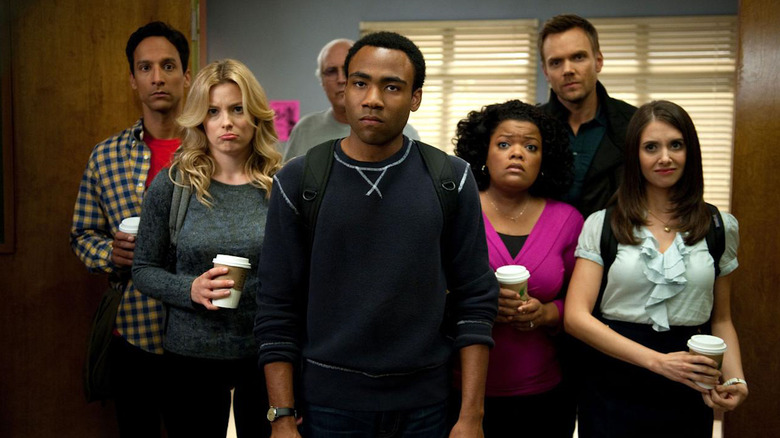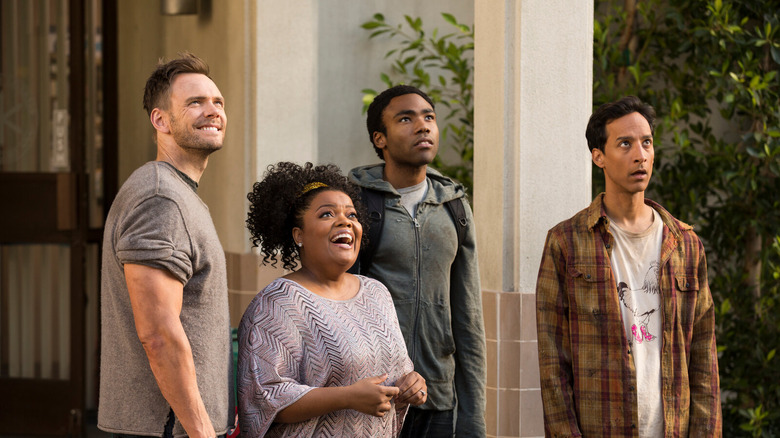Why Dan Harmon Won't Call Community A Sitcom 'Spoof'
There are quite a few ways someone could describe the way the NBC series "Community" approached its sitcom status. Call it deconstruction, call it subversion, call it homage, but whatever you do, do not call the series a "spoof."
The show, which ran for five seasons on NBC before hopping over to Yahoo for its final season, played with the sitcom format to create something a little more interesting. Whether an episode played around with tropes or Abed (Danny Pudi) simply pointed out how "real life" was just like a television show, there was always a meta aspect of "Community" that turned the humor into a commentary on, well, humor.
Series creator and showrunner Dan Harmon would end up taking the lessons he learned from his time at Greendale Community College to his next series, "Rick and Morty," but not before leaving an indelible mark on the prime-time sitcom. In an interview with Salon back in 2011, Harmon dug deep into his inspirations for the meta-comedy of "Community," and explained that while it is certainly riffing on sitcoms, it's not a spoof.
Making use of the medium
When Salon's interviewer asked Harmon if he would call "Community" a spoof of sitcoms, he was hesitant to do so. After all, a spoof is something that pokes fun at a particular format, albeit lovingly, and "Community" was more interested in examining the format and using it in new and unique ways:
"It's not really a spoof of the sitcom format, I guess, because the sitcom format is being as much honored and appreciated by the show as it is sometimes rattled by the show's energy. If there is a consciousness drawn to the frame around the show, it's never to suggest that the frame shouldn't be there. It's always just making use of the medium. There are a lot of nice things that the format can do for you as a storyteller. I don't know — the canvas, its paint swirls outward, and then sort of blends with the frame, and makes it easier for me to accept that this is a two-dimensional thing hanging on the wall."
The "consciousness to the frame" Harmon is talking about is probably Abed's penchant for pointing out the sitcom elements that pop up in the character's lives. The character very rarely actually breaks the fourth wall, and instead of directing his explanations about the sitcom world to the camera and audience, he instead tells his (somewhat baffled) friends. They tend to tease him for his obsession with sitcoms, especially when he gets into a class on who was really the boss in "Who's the Boss?", but he's actually right, since they do technically exist within a sitcom. It makes for more complex storytelling, and helps blend reality with fiction in a more compelling way than just telling a straightforward sitcom story.
Harmon and Abed have a lot in common
There's a bit of Harmon in Abed, because Harmon sees the world through a storytelling lens as well. Both Harmon and Abed use the rules of fiction to help them define reality, which is something many neurodivergent people with autism spectrum disorders and attention deficit disorders do in order to process the world. (I know I do!) Harmon decided to communicate through fiction as well, telling a story for everyone that still spoke for him:
"I grew up watching TV. Saying something is TV is like saying it's a sonnet or a haiku. It's got its rules, and those rules, when obeyed, are part of what makes the thing beautiful. You use it to communicate to someone. If you say, ”This is a sonnet I wrote for you,' then you better not give them a limerick. If you say, 'This is a limerick that I wrote for you,' you're using that medium. This is a sitcom for everybody, and it's through that medium, the sitcom, that I'm saying, 'This is what humanity has been to me, for 38 years.' So yeah, you're seeing something that is supposed to be kind of alienating and snarky, yet there's this weird guy behind it all who is saying, 'This is how I am communicating with you.' That's why the show is neither spoof nor humble servant to its medium."
We got six seasons of "Community" to tackle just about every element of the medium, but with the long-prophesied movie finally on the way, maybe we'll get to see Harmon take on storytelling tropes for a new medium: the silver screen! The mechanics of movies are pretty different from the structure of a sitcom, so it could give Harmon a chance to really stretch his skills and pay homage to the movies that shaped his view of the world. We already know some of them, like "My Dinner with Andre," "The Sting," and "Pulp Fiction," because they had moments on the series, but it will be fun to see what else Harmon riffs on in the film. Just don't call it a spoof.


